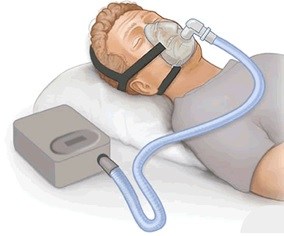 I am excited to be trying out CPAP (continuous positive airway pressure) for the first time tonight. I am looking forward to getting a few things out of it. Since I treat patients with sleep apnea regularly, I plan to gain insight into providing better care for my patients. On a more personal level, I hope to gain some benefits from trying out CPAP, such as losing some weight, as CPAP usage is associated with weight loss. I also have an office pool going on who can lose the most weight in a month, so this, in addition to diet and exercise, might help me win. The other benefits such as improving my health, having more energy during the daytime and snoring less (if I actually do ever snore–I have never heard myself snore) will also be welcome. As I gain insight, I hope to share my experience of trying out CPAP with readers in a series of blogs and videos.
I am excited to be trying out CPAP (continuous positive airway pressure) for the first time tonight. I am looking forward to getting a few things out of it. Since I treat patients with sleep apnea regularly, I plan to gain insight into providing better care for my patients. On a more personal level, I hope to gain some benefits from trying out CPAP, such as losing some weight, as CPAP usage is associated with weight loss. I also have an office pool going on who can lose the most weight in a month, so this, in addition to diet and exercise, might help me win. The other benefits such as improving my health, having more energy during the daytime and snoring less (if I actually do ever snore–I have never heard myself snore) will also be welcome. As I gain insight, I hope to share my experience of trying out CPAP with readers in a series of blogs and videos.
I have been convinced that trying out CPAP might be the best thing that I can do for my health and wellbeing at this stage of my life. Most of my patients who have sleep apnea are treated with CPAP. They have often provided me with very positive feedback of their experience. Some have compared the technology to being the best invention since sliced bread. Others have told me their sleep is better, that they have more energy, are no longer tired, or that their high blood pressure has come down without medication.
CPAP is the best sleep apnea treatment
CPAP is the best treatment for sleep apnea. That is good considering I may have some mild sleep apnea. Apnea is broken down into mild, moderate or severe based on how many apneas take place, on average, in an hour. Less than 5 events/hour is considered normal, 5 – 14 events/hour is considered mild (that’s where I may fall), 15-29 events/hour is moderate and 30 events/hour or more is severe. In cases of more mild sleep apnea, symptomatic improvement is the goal. In other words, the goal is to feel better or reduce other physiological effects of sleep apnea, like elevated blood pressure. I often suggest to patients who have mild sleep apnea that they try out CPAP for at least three months. If they notice benefits they can continue. If they have problems tolerating the device, then alternative therapies are available or consideration can be made for stopping therapy if they receive no benefit from treatment.
I am starting out with the Resmed S10 and the Wisp Nasal Mask. In the future, I plan to create videos describing different machines and masks, perhaps reviewing them for others who are considering using them. I will post them to Youtube on the newly created YouTube channel of the American Sleep Apnea Society.
